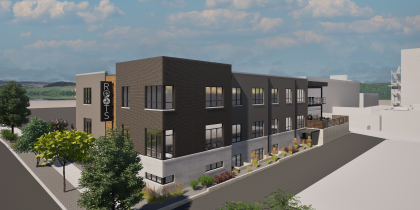Growing a Rural Healthcare Workforce: How Community Hospital in McCook is Cultivating Roots for the Future

Published by Community Hospital Corporation on November 11, 2025
By Sean Wolfe, Chief Financial Officer, and Lori Beeby, VP of Support Services, Community Hospital, McCook, Nebraska
Across rural America, hospitals are confronting a shared challenge: finding and keeping the skilled professionals needed to deliver quality care close to home. The shortage of nurses, therapists, and other clinicians has left many communities searching for creative solutions. Community Hospital in McCook, Nebraska, is meeting this challenge through programs that connect education, housing, and community engagement to grow the next generation of rural healthcare professionals.
Building a Pipeline for Rural Practice
The Rural Immersion Project began as a partnership with the University of Nebraska at Kearney (UNK) and has grown into a model for community collaboration. Hospital leadership also engaged with McCook Chamber of Commerce, McCook Economic Development Corporation (MEDC), and other community organizations to make the program community-wide. The program was created to give health science students real-world exposure to rural healthcare while introducing them to the lifestyle and opportunities a small town offers. Each year, students in nursing, physical therapy, radiology, and physician assistant programs spend one to two weeks in our hospital and community.
During their time in McCook, participants rotate through multiple hospital departments, shadow clinical teams, and meet with community leaders to understand how health, education, and local business intersect in a rural setting. The goal is to give them both professional experience and a personal connection to rural life. For many students, the experience serves as an introduction to the close relationships and broad clinical exposure that rural medicine offers.
The Rural Immersion Project has continued to evolve since its launch in 2023. What began as a pilot program has expanded to include a wide range of participants from across Nebraska and neighboring states. Students receive academic credit for their experience and often return to campus with a deeper interest in rural healthcare practice. For some, the immersion has already sparked career decisions that may bring them back to communities like ours.
Creating a Place to Stay and Belong
As participation in the Rural Immersion Project grew, housing quickly became a barrier to further expansion. In a small town, available short-term lodging for multiple students at once can be difficult to find. To solve this, Community Hospital leaders developed the ROOTS (Rural Opportunities Offering Tomorrow’s Success) housing initiative, which centers around a 12-unit apartment complex located in downtown McCook, planned, built, and managed by the hospital.
ROOTS was designed to do more than provide a place to stay. It was built to connect Rural Immersion Project students with the heart of the community. Living downtown gives them access to local shops, restaurants, and events while helping them feel like they are part of the town they are serving. The building is also a year-round resource for students in longer-term rotations, including residents, physician assistants, pharmacy students, and other healthcare learners.
The project is part of the hospital’s broader People Pillar, which reflects a commitment to recruiting, training, and retaining skilled professionals by creating environments where they can thrive. The ROOTS initiative included detailed plans for construction, scheduling coordination with colleges, and management of day-to-day logistics such as cleaning and maintenance. Local businesses and civic organizations have also been invited to participate, with potential use of the apartments for student teachers or engineering interns, reinforcing McCook’s reputation as a place for learning and growth.
Early Results and Expanding Impact
Even in its early stages, the Rural Immersion and ROOTS programs are making an impact. Students consistently describe their experience as meaningful and eye-opening. Several have expressed interest in returning to McCook or another rural community to begin their careers. One participant, who joined the program as a sophomore, is now considering a full-time position in this area after graduation, supported by tuition assistance and local incentives.
The programs have also strengthened relationships with academic partners across the state, creating new pathways for collaboration. By working closely with universities to align scheduling, course credit, and housing availability, Community Hospital is helping shape a statewide model for sustainable rural workforce development.
A Model Other Communities Can Build On
Every rural community has unique strengths to build upon. For McCook, that asset is its vibrant downtown and the strong partnerships that make projects like ROOTS possible. For others, it might be university housing, local industry partnerships, or regional training programs. The key is to make it easier for students to experience rural life firsthand and to see the opportunities available and the lifestyle benefits.
Hands-on learning opportunities, strong community connections, and accessible housing can make all the difference in turning a short-term student experience into a long-term career decision. What began as a small pilot project in McCook has grown into a replicable framework that other communities can adapt to their own needs.
Looking Ahead
As healthcare continues to evolve, rural hospitals must take bold steps to ensure access to care for generations to come. The Rural Immersion Project and ROOTS initiative represent our investment in that future. By cultivating experiences that connect people, purpose, and place, Community Hospital is planting roots that will strengthen both our workforce and our community for years to come.
